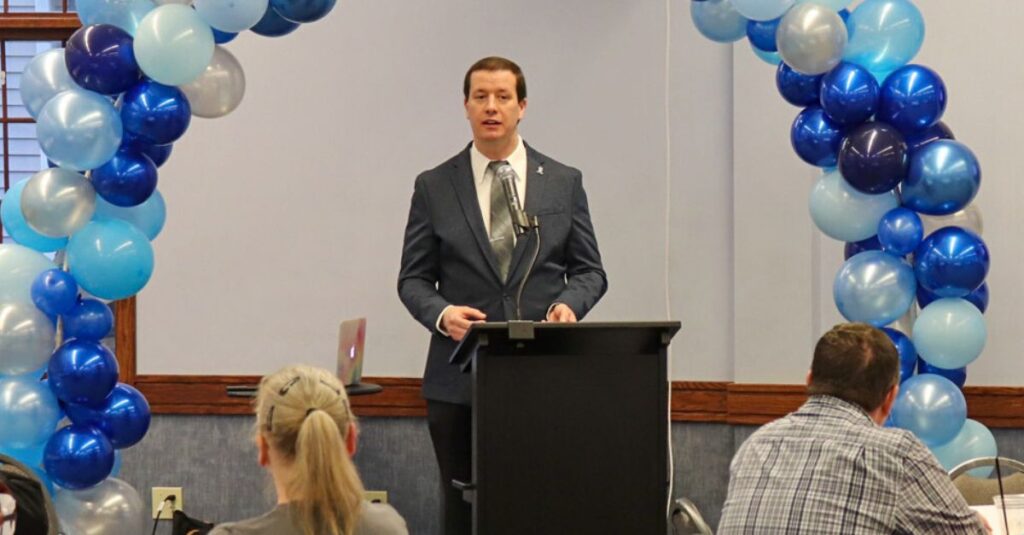
As a family physician at Western Missouri Medical Center, Dr. Jason Snowden cares for patients of all ages. Part of that care is performing endoscopy procedures like colonoscopies that can detect—and prevent cancer.
“It sounds weird, but colon cancer prevention is something I actually enjoy doing and am passionate about,” he said. “So much of what we do in medicine is manage illness. Whether it’s diabetes or high blood pressure, we’re just trying to keep things under control, and colon cancer prevention is something that can make a definitive impact.”
To highlight the importance of cancer prevention and colon health this March, Dr. Snowden urges eligible adults to not put off the procedure, as it’s not only effective at detecting colon cancer but has been shown to prevent one out of every three colon cancer deaths in the United States.
“There is some stigma surrounding the topic. People think because they don’t have a family history or aren’t experiencing symptoms, they don’t need a colonoscopy,” he said. “I really think there is probably a lack of awareness around colon cancer that drives patient reluctance.”
Colorectal Health: What You Should Know
Many experts predict that colon cancer will be the most common form of cancer in young people by the year 2023—a trend that has been rising since the 1990s. In fact, the American Cancer Society lowered the age for colonoscopy screening to 45 in 2018 to address the growing instances of colon cancer in younger individuals.
“For about every 250 people who get scoped, you might find about one colon cancer. That’s significant enough that it’s worth screening, especially if it’s you or your loved one,” Dr. Snowden said. “We find a polyp in about 40% of people who come in having never been screened before.”
With proactive detection and screening efforts, the rate of colon cancer deaths in older people has been declining due to timely intervention and care—like colonoscopies.
Colonoscopy screenings can also prevent colorectal cancers by detecting and removing pre-cancerous polyps before they turn into cancer, which is vital as many people with colon cancer will not experience noticeable symptoms.
Are You Eligible for Screening?
Anyone can develop colon cancer; however, Dr. Snowden explains that some lifestyle factors can contribute to developing colon cancer, including obesity, alcohol consumption, smoking or diet, especially a diet low in fiber or high in red meat. Other patients are at risk for colon cancer based on family history or chronic illnesses, including diabetes or irritable bowel conditions.
“A lot of people are just genetically at risk for colon cancer,” he said. “When a patient has a family history of colon cancer, we want to scope them a lot sooner, every five years. We want to re-scope patients who’ve had polyps in the past sooner as well.”
Based on current recommendations, most people start colorectal cancer screening at age 45. If you have a family history, your doctor may recommend starting at age 40 or 10 years before the age that your immediate family member was diagnosed. Patients with family history or certain health conditions may also receive other colorectal screenings.
What to Expect
Dr. Snowden emphasizes the safety of colonoscopies and wants patients to know that procedures and preparations have evolved over the years to be more comfortable and less intimidating.
The preparation solution required for a colonoscopy has drastically improved with time. It no longer resembles what many associate with the procedure. Dr. Snowden assures his patients beforehand that WMMC uses the most effective and least voluminous preparation available, which causes little to no discomfort or nausea.
“Drinking a gallon of preparation fluid is becoming a thing of the past,” he said. “We’re using 12 ounces of concentrated Suprep, or flavorless tablets taken over five hours. It’s very well tolerated nowadays. Over the years, it has continued to evolve and become easier and easier to do.”
Furthermore, the procedure itself is an outpatient procedure at WMMC and patients and typically in and out on the same day with very little recovery time.
Conclusion
Dr. Snowden sees patients Monday through Thursday and performs endoscopy procedures on Tuesdays at WMMC.
“We’re in a community with a great medical facility,” he said, noting that WMMC has six providers who perform colonoscopies. “There’s peace of mind knowing you’re not just leaving yourself at risk for colon cancer developing and progressing.”
Colonoscopies are covered by most insurers. Talk to your primary care or internal medicine physician for a referral or visit wmmc.com/colonoscopy.
